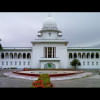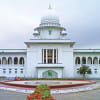Fourth Amendment: It 'impairs freedom of lower judiciary'
The amendment giving the president the power to have control over lower courts violates the basic structure of the constitution as the change impairs the independence of the lower judiciary, observed the Supreme Court in the 16th amendment case verdict.
According to the SC verdict, the independence of the judiciary is one of the basic structures of the constitution and parliament cannot bring any change that goes against it.
The original article 116 of 1972 constitution empowered the SC to have control over the affairs of lower judiciary, including the posting, promotion, grant of leave and discipline of the judges and judicial magistrates.
But parliament through the fourth amendment to the constitution during the AL rule in 1975 scrapped that authority of the SC and gave it to the president.
Later in 1978, during the martial law regime, the article was amended further through the martial law proclamation and a provision was introduced saying the president would exercise the authority in consultation with the SC.
In 2011, the 15th amendment to the constitution retained the same provision in article 116.
"By this substitution of the word 'President' for the words 'Supreme Court' in article 116, the independence of the lower judiciary has been totally impaired, curtailed and whittled down," observed the SC in the 16th amendment verdict, delivered on July 3.
"This amendment [fourth amendment], therefore, violates the basic structure of the constitution and therefore this substitution of the word 'President' is ultra vires the constitution."
According to Merriam-Webster dictionary, ultra vires, a Latin phrase, means beyond the scope or in excess of legal power or authority.
“Though there was a provision for consultation in exercising this power, practically this consultation is meaningless if the executive does not cooperate with the Supreme Court,” the court added.
It further said current article 116 is also inconsistent with article 109 and 116A.
Article 116 says, “The control (including the power of posting, promotion and grant of leave) and discipline of persons employed in the judicial service and magistrates exercising judicial functions shall vest in the President and shall be exercised by him in consultation with the Supreme Court.”
Article 109, which has been in the constitution since 1972, reads: "The High Court Division shall have superintendence and control over all courts and tribunals subordinate to it."
And article 116A, introduced by the fourth amendment, says: "Subject to provisions of the constitution, all persons employed in the judicial service and all magistrates shall be independent in the exercise of their judicial functions."
At first sight, it may seem that the president has been empowered by the amendment to article 116. But in reality, he himself cannot exercise the power. The prime minister exercises the power as the president performs all his functions on advice of the prime minister, except for the appointment of the PM and the chief justice.
"There cannot be any independence in the judiciary if the disciplinary mechanism including the power of appointment, posting and promotion of the officers of the lower and higher judiciary are kept in the hands of the executive," said the SC verdict.
It also said there is no mechanism under the scheme of the constitution as to how the executive branch shall control the power of posting, promotion and discipline of persons employed in the judicial service and the higher judiciary.
"Keeping articles 116 and 116A intact and substituting article 96 [empowering parliament to remove SC judges], the judiciary is totally crippled now. This has caused embarrassment on the part of the Chief Justice in the administration of justice in higher and lower judiciary to the knowledge of the Executive."
The full text of the judgment was released yesterday.
It said there were 12 amendments to the constitution after the fourth amendment. None of the governments took any step in this regard despite the observations by this court in 5th, 8th and 13th amendment cases.
In the verdicts in those cases, the apex court stressed the need for restoration of the original article 116.
Of the seven members of the Appellate Division bench, the chief justice and two other judges agreed with the findings about article 116 in the 16th amendment verdict. One judge disagreed while three others did not make any comment.
In the verdict, the SC said the subordinate judiciary has been brought most closely into contact with the people. "It is thus no less important, perhaps indeed even more important that its independence should be placed beyond question. To establish the rule of law, the subordinate judiciary must also be independent and impartial.”
It added, "Shocking situation now the judiciary is facing that till now nothing has been done to give effect to article 22 despite the direction given in Masder Hossain.”
Article 22 says: "The State shall ensure the separation of the judiciary from the executive organs of the State."
As successive governments since 1972 refrained from separating the judiciary from the executive, the High Court in a landmark verdict in May 1997 asked the government to separate the judiciary in line with the constitutional provision.
The then AL-government challenged the HC judgment and filed an appeal with the Appellate Division.
Upholding the HC verdict, the Appellate Division in its milestone ruling in December 1999 issued a 12-point directive to the government to separate the judiciary.
The government then opted to buy time to take necessary measures, like formulation of rules and regulations, to implement the judgment until the tenure of the AL-led government ended in October 2001.
After the changeover in power, the BNP-led government in its five-year tenure did the same.
Both AL and BNP governments from 1999 to 2006 took more than two dozen time extensions to complete the necessary work.
Finally, it was the caretaker government of 2007-08 that took effective steps to separate the judiciary.
In November 2007, the then caretaker government officially separated the judiciary from the executive. Some rules were also made.
The process was not completed as the rules determining the discipline and code of conduct for lower court judges were not made.
Over seven years after the official separation of the judiciary, the government drafted rules in 2015 and sent those to the SC for its opinion last year.
In the draft rules, which deal with issues like posting, promotion, grant of leave and discipline of judges and judicial magistrates, the law ministry included some provisions to retain the power to control the lower judiciary.
The SC revised the draft by curtailing the law ministry's control over lower judiciary and sent it back to the government for issuing a gazette to this effect.
But the government refrained from doing so and took time extension for more than a dozen times.
In the latest move, the law ministry brought some changes in the draft rules and submitted it to the chief justice last week.
The proposed changes gave the president the authority to play significant role in taking disciplinary actions against lower court judges and judicial magistrates and carrying out investigation into allegations against judicial officials working at other ministries on deputation.
The changes irked the apex court and on Sunday it refused to accept in full the draft rules.
The law minister on Monday defended article 116 and alleged that the SC wants to take away the president's power provided under the article.

 For all latest news, follow The Daily Star's Google News channel.
For all latest news, follow The Daily Star's Google News channel. 








Comments